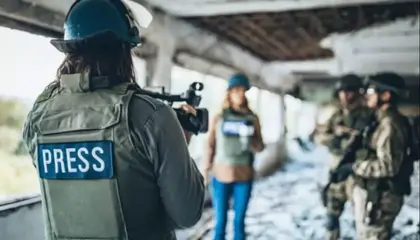On World Press Freedom Day – Friday, May 3 – Swedish Radio’s Director General and Vice President of the EBU, Cilla Benkö, said that media freedom in Europe is under dire threat.
She called for the safety of journalists and respect for independent, trustworthy reporting, warning that threats to media freedom go hand in hand with threats to democracy.
JOIN US ON TELEGRAM
Follow our coverage of the war on the @Kyivpost_official.
Cilla Benkö is the Director General of Swedish Radio and Vice President of EBU.
On World Press Freedom Day, I am compelled to write about a subject that lies very close to my heart – and has done so my entire career. Namely, media freedom.
We are all experiencing very worrying times – with rapid and profound changes going on in the world.
We have ongoing wars in Ukraine and in the Middle East and globally we see a democratic decline in many countries – also in Europe. Seventy-one percent of the world’s population now live in autocracies – up from 48 percent ten years ago. This is a chilling change.
One of these countries is of course Russia, where media freedom has been strangled since the invasion of Ukraine.
The Russian Duma has criminalized factual reporting, international correspondents have been arrested – accused of espionage and being “foreign agents” – and the Kremlin has blocked access to trustworthy and independent media outlets.

Finns Probing Ship from Russia for ‘Sabotage’ of Power Cable
The Russian population – and the world – have basically been robbed of its right to information.
Meanwhile, we are experiencing the biggest assault on truth and democracy of our time.
An information war is taking place also in the digital landscape. Generative AI has – while offering new and exciting opportunities – also led to new and almost endless possibilities for those who wish to create chaos or instability by spreading propaganda and disinformation.
Personally, I’m convinced that the need for strong and independent media has never been greater, and that journalism has an important role to play.
We all need professional and impartial journalists who can be our eyes and ears on the ground. We need reporting and information that we can trust. This is an extremely important factor in countering disinformation.
For the sake of democracy and society, we need journalists that can keep holding power to account and unveil injustices – especially in times of crisis.
My colleague Mykola Chernotytskyi from the Ukranian public service broadcaster Suspilne can confirm this with absolute clarity. I`m just back from visiting him in Ukraine where I got to see first-hand what independent and trustworthy journalism really brings to a society in difficult times. The importance cannot be overstated.
The last decade has been challenging for the media sector, to say the least. Financial competition from global tech giants with endless budgets – falling ad revenues – rising energy prices and inflation has taken its toll.
Meanwhile media organizations and journalists have become a target for actors trying to steer the narrative. As for instance, when a government is trying to take control of a public broadcaster – as we have seen in Slovakia this spring.
Further, journalists are being targeted as the enemy, as biased, as part of an elite. We must see and educate ourselves on the purpose behind these attacks. Anyone who succeeds in devaluing trust in independent media has an easier time influencing a country from the outside.
On an individual level the number of threats aimed at journalists has significantly increased the last decade – and hostility and attacks towards journalists are on the rise.
Even in my own country Sweden – a country with high trust in the media and with the world’s oldest media freedom laws in the world – we have seen a substantial increase of threats and hate speech mainly online. Journalists are being targeted and harassed in various ways. Even I, from time to time, need personal protection. This was not the case for my predecessors.
It’s important to be aware of this development, and to know that there are consequences. There are signs to indicate that some journalists avoid certain topics, as a direct result of – or fear of – being threatened or subjected to hate speech.
But there are of course journalists that are in a more acute danger, putting their lives on the line so that we all can get vital information on what’s going on in the world. Like now in Kharkiv or in Gaza.
In the wars in Ukraine and between Hamas and Israel we see a devastating loss of lives: children, families, civilians and aid workers. But the last year has also been the deadliest for journalists in modern time. Despite the fact that international law stipulates protection for journalists and civilians in conflicts.
It is therefore critical that crimes against journalists are investigated, prosecuted, and punished. Unfortunately, this is not the case today. According to UNESCO, only one out of ten cases when a journalist is killed is solved and someone get sentenced and punished.
The topic concerns all of us wishing to live in a well-functioning democracy. Preserving and strengthening media freedom therefore lies on all our shoulders.
This op-ed is based on a keynote speech that Cilla Benkö gave at a press freedom event on 2 May, arranged by the Swedish embassy in Berlin: “Defending press freedom in times of war and crisis”.
You can also highlight the text and press Ctrl + Enter






